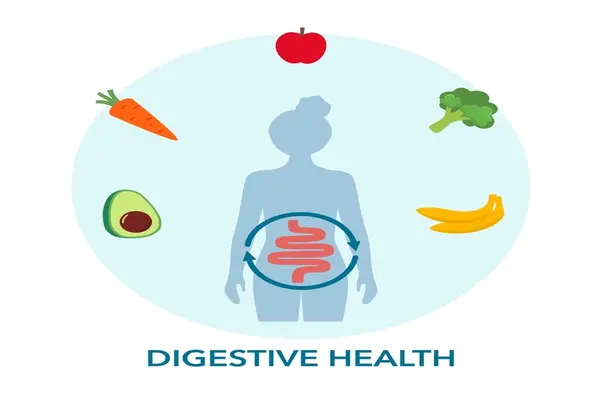Discover Resilient Digestion: The Foundation for Lifelong Wellness
- Harmony
- 4 Min
- August 25, 2024
- Kenneth Koch, MD
- Every Day Health, Wholeness
The Gut-Body Connection: How Digestion Impacts Your Overall Health and Happiness
The health of your gut is a vital aspect of the way you feel as a whole, affecting anything from digestion to metabolism to mood as well as immunity to infection. The article investigates including brain-stomach connection, the impact of stress on resilient digestion, and simple strategies for gut wellness management. Check out how you can achieve strong gut and long-lasting wellness with the assistance of Wellness Garden’s specialized programs.

Introduction
Did you discover that the GI tract is often called the “second brain”? It affects your brain and spinal cord right away, it affects your state of mind and quality of life. In the rush of juggling career, family, and personal objectives, women in their 30s and 40s might ignore their gut health. Stomach problems may cause us to feel tired and anxious. They often come on because of stress, erratic eating habits, and environmental factors.
With more nerve cells in the GI tract than in the spinal cord, the brain and gut are deeply connected. According to research published in the book Neuroscience shows how stress and worry may mess with digestion, cause pain, and have an effect on everyday life.
Why is women’s gut wellness essential?
Your digestive system isn’t the only thing your gut does for you; it maintains your entire wellness. According to research by the National Institute of Diabetes and Digestive and Kidney Diseases, digestion plays an essential role in converting food into nutrients like amino acids, fatty acids, and carbs that the human body needs for growth, repair, and energy. For women, immune system performance, energy levels, and even mood are all affected by gut health.
Although this healthy balance can be broken by stress, bad eating habits, and ignoring yourself, which can result in problems like lack of sleep, bloating, and ulcers, Having a healthy gut is essential to feeling your best and staying active.
Quick Tip: Have a glass of warm lemon water to start your day. Warmth aids in digestion, and the natural cleansing qualities of lemon improve intestinal health. It’s an easy way to get your day going and put your wellness first.
Stress and its effects on resilient digestion
Stress damages not just your mental state but also your resilient digestion system. If stress triggers the fight-or-flight response, it may give rise to esophageal spasms, excess acid in the stomach, gas, cramps, or diarrhea. As stated by Wake Forest University gastroenterology professor Kenneth Koch, MD, anxiety can influence all aspects of the digestive system.If the digestive system is off, you may notice the following:
Bloating and gas: commonly caused by a poor diet or tension.
Irregular Bowel Movements: triggered by anxiousness as well as insufficient fiber.
Ulcer – a hole in the mucous membrane lining the stomach or duodenum.
Fatigue is the result of insufficient nutrient absorption based on digestive problems.
Food Sensitivities: triggered by emotional stress and stomach deficiencies.
How Digestion works in the body?
Digestion starts with the digestive tract microbiome, essential to immune function and mental health. As a defensive mechanism, the stomach keeps dangerous invaders out. Both the liver and pancreas dissolve down carbohydrates, fats, and proteins through the creation of bile and enzymes that break down food.
In the small intestine, essential vitamins and minerals are absorbed. The gut-brain link allows communication with the brain, affecting stress and mood. Hormones like CCK and gastrin regulate digestion, while the liver handles detoxification, removing harmful substances. Together, these functions ensure effective digestion and promote health.
The advantages of good digestion
Good digestion brings several important benefits for overall health. Initially, it increases immunity, boosting the immune system against disease. Better digestion will result in pain relief and less discomfort as a result of effective nutrition absorption & breakdown. As a healthy gut can mitigate anxiousness while boosting mental health in general, the gut-brain axis is additionally linked to a happier mood.
Moreover, a stable gut helps minimize disease risk, lowering the chances of chronic illnesses like heart disease and Type 2 diabetes. It also supports weight control, aiding in appetite regulation and proper weight management.
A well-functioning digestive system is vital for overall health, involving everything from mental to immune function.
Alternative gut restoration programs by Wellness Garden
The Wellness Garden offers customized initiatives to improve your intestinal health, such as:
- Acupuncture improves digestion and minimizes anxiety.
- Naturopathy: maintains gut health using natural remedies.
- Reflexology is the practice of stimulating your feet’s digestive points.
- Dietary counseling offers customized diets.
- Probiotic treatment replenishes the gut with good microorganisms.
- Breathing exercises and yoga enhance digestion and calmness.
- Cupping therapy minimizes irritation and increases circulation.
- IV therapy provides immediate nutrient delivery for better overall well-being.
End note
Your gut is the initial step on your path towards better health. You can get better energy and mental health by appreciating the strong link between the brain and the GI tract and by making healthy digestion a priority. The customized courses offered by Wellness Garden are here to support you at every opportunity. Together, let’s strengthen the gut’s ability to make you healthier and more fulfilled.
Do email to reach out to Wellness Garden for tailored advice and therapy choices.
- Table of Contents
- • Introduction
- • Why gut wellness essential?
- • Stress and its effects on digestion
- • Benefits of Strong Digestion
- • What WG offers?
Recent Posts
Join Our Newsletter
End note from WG Team
Dr.Geetha
Physician
Disclaimer: This information is provided for educational purposes and should not be construed as medical advice. Please consult with healthcare practitioners before undertaking any changes in wellness routines or adding new therapies.
Latest Blogs
Check out some of your blogs related to your interest.
- July 7, 2025
- Master Choa Kok Sui
- 3 Mins

- June 19, 2025
- CCSU
- 3 Mins

- June 17, 2025
- Dr. Amod Manocha
- 2 Mins
- June 13, 2025
- Dr. Sreedhar Pulipati, B.N.Y.S
- 3 Mins







